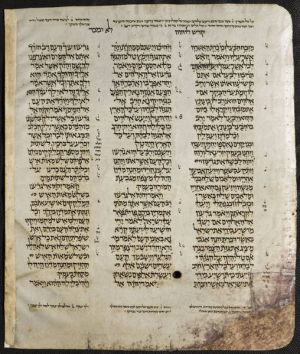Oldest Hebrew Bible in existence gets UNESCO recognition

The oldest copy of the Hebrew Bible in existence has been added to UNESCO's Memory of the World Register.
The register was begun in 1995 and now comprises around 300 items and collections, located around the world. It includes significant cultural treasures that have contributed to human development.
The Aleppo Codex dates back to 930 AD and is on permanent display at the Israel Museum in Jerusalem. It contains most of the Old Testament, though 200 of its original 500 pages are missing.
It was looted from a synagogue in Jerusalem during the First Crusade and taken to Egypt, where it was used by the renowed Jewish scholar Maimonides, who described it as a text trusted by all Jewish scholars.
The Codex is also known as the "Crown" (Keter) and is considered by many scholars to be the most exact and authoritative Hebrew Bible.
It is thought to have been brought to Aleppo in Syria by one of Maimonides' descendents in 1375.
The Codex remained in Aleppo's great synagogue, itself thought to have been built over the cave of Elijah, until 1947, when the synagogue was destroyed in riots after the UN plan establishing the State of Israel was announced. It was eventually brought to Israel but there has been continued controversy over the whereabouts of the missing pages, with accusations that they may have been taken and sold for profit.
Among other documents added to the Memory of the World register are the theological papers of Sir Isaac Newton and the files and library of the Unity of the Brethren, the Church founded by Jan Hus, who was martyred in 1415.











